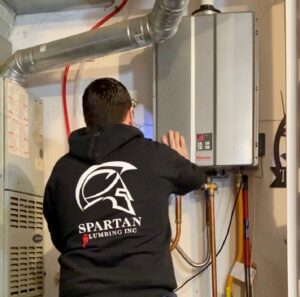
Selecting the right water heater for your home helps provide a steady supply of hot water and can reduce energy use.
The best size depends on things like the number of people in your household, your weekly hot water use, and when you use the most hot water.
Understanding these needs will help you make a smart choice that avoids wasting energy.
Let Spartan Plumbing Inc. help you find the right water heater for your home. Contact us today for expert advice and professional installation.
Table of Contents
- Key Takeaways
- Understanding Water Heater Types and Their Sizing
- Key Elements When Choosing a Water Heater Size
- How to Choose the Right Size for Your Household
- Get the Right Water Heater Size for Your Home Today!
Key Takeaways
- Start with your household’s usage habits. Knowing when and how you use hot water is the first step toward choosing the right size.
- Peak-hour demand matters. Match the water heater’s First-Hour Rating (FHR) to your busiest hour to avoid running out of hot water.
- Think about multiple uses at once. Overlapping activities like showers, dishwashing, and laundry can increase your demand quickly.
- Weather and household changes play a role. Seasonal shifts and home upgrades can affect water heater performance and sizing.
- Different heater types have different needs. Tank, tankless, and hybrid heaters all have unique sizing guidelines.
- Space, energy, and climate affect your decision. These factors help narrow down the right model and capacity.
- Professional advice helps. A licensed plumber can help you avoid guessing and choose the right solution for your home.
Assessing Your Household’s Hot Water Demand
Start by figuring out how much hot water your household uses. Think about the times and activities that require hot water. This will guide you toward picking the right unit for your situation.
Peak-Hour Usage Calculation
 Peak-hour usage refers to the highest amount of hot water your household needs during the busiest hour of the day. This part is helpful when selecting a water heater that can handle those peak times. Common household activities that use hot water include:
Peak-hour usage refers to the highest amount of hot water your household needs during the busiest hour of the day. This part is helpful when selecting a water heater that can handle those peak times. Common household activities that use hot water include:
- Showering: 10–15 gallons per person
- Hand dishwashing: 4 gallons
- Running a dishwasher: 6 gallons
- Laundry (per load): 7 gallons
For instance, if two people take showers and a dishwasher is running at the same time, that’s about 26 gallons. Adding laundry to the mix could raise your peak demand to about 66 gallons.
Knowing how much you use can help guide your tank size choice. A 50–60 gallon tank usually works for one to two people, while a larger family might need an 80-gallon tank.
Recognizing Simultaneous Usage Patterns
Many households use hot water for more than one task at once. For example, someone may be showering while another is washing dishes or running a load of laundry. If your water heater isn’t sized for these overlapping uses, you could run out of hot water. Be sure to include these patterns when deciding what size to go with.
Account for Seasonal and Special Event Fluctuations
Hot water use often changes depending on the time of year or during events. In colder months, the incoming water is colder and takes more energy to heat.
For instance, in areas where the incoming water temperature drops below 50°F (10°C) in the winter, you may want a larger water heater to make up for the extra work it needs to do. Family gatherings or increased use in the summer, such as after swimming, can also raise demand.
So when figuring out the size that works for your home, keep these changes in mind.
Thinking Ahead to Future Adjustments
Changes like adding a bathroom, upgrading appliances, or growing your family can increase your hot water use. By selecting a size that offers some flexibility, you won’t need to replace your water heater later if your needs increase.
If you’re planning to finish your basement or add more space to your home, you might want to go with a larger unit that can support higher demand later on.
Understanding Water Heater Types and Their Sizing
Once you know how much hot water you need, the next step is choosing the type of water heater that works best. The three main types are tank, tankless, and hybrid water heaters. Each one works differently and has its own sizing method.
Tank Water Heaters: Capacity and First-Hour Rating (FHR)
Tank water heaters store hot water in a tank. The tank size determines how much hot water is available at once.
The First-Hour Rating (FHR) tells you how much hot water the heater can provide in the first hour of use. Here’s a general guide:
- 1–2 people: 30–40 gallons
- 3–4 people: 50–80 gallons
- 5–6 people: 80+ gallons
For example, a 30-gallon tank is often enough for two people. For bigger households, something like an 80-gallon unit is usually a better match.
Tankless Water Heaters: Flow Rate and Temperature Rise
 Tankless water heaters heat water as you use it. They don’t store hot water, so their size depends on how much hot water you use at the same time.
Tankless water heaters heat water as you use it. They don’t store hot water, so their size depends on how much hot water you use at the same time.
To choose the right size, figure out your peak flow rate in gallons per minute (GPM). In colder areas, you also need to consider how much the water temperature needs to rise to reach your preferred setting. For instance, if the water entering your home is 50°F (10°C), your unit needs to heat it up by at least 50°F.
Tankless units work well for smaller homes or lower hot water use, but they must be sized correctly for homes with higher needs.
Hybrid Water Heaters: Efficiency and Size
Hybrid water heaters use a heat pump along with a traditional tank. These units are very efficient and usually suit medium to large households. An 80-gallon hybrid heater is a good fit for a family of four and may help reduce energy bills over time.
Just be aware that these models tend to be larger than standard tank heaters, so check that you have enough space for installation.
Key Elements When Choosing a Water Heater Size
When you’re picking a water heater, it’s helpful to think about factors like how much space you have, energy usage, local weather, water quality, and fuel type.
Consider Installation Space
Measure your available space before buying. Tank heaters often need more room for ventilation, while tankless models can be installed in tighter areas. Extra space also makes repairs and upkeep easier in the future.
Energy Efficiency Ratings
An energy-saving model can lower your long-term costs. Look for ENERGY STAR®-certified units to help you save money and power. Choosing a properly sized heater also helps avoid wasting energy—oversized units tend to use more fuel than needed.
Local Water Quality and Climate
If you live somewhere cold, you’ll likely need a larger heater because the water coming into your home is colder and takes more effort to heat. In areas with hard water, a water softener can help extend the life of your water heater and keep it running efficiently.
Review Fuel Types
Water heaters may run on gas, electricity, or solar energy, depending on where you live and what’s available. Gas models heat water quickly, while electric ones are often easier to install and widely available. Solar-powered units are more eco-friendly but may need extra heating help during the winter.
How to Choose the Right Size for Your Household
Getting the right water heater size means you’ll have enough hot water for your needs without wasting money on energy. Look at how many people are in your home, when you use the most hot water, and what kind of heater works best for your situation.
Match First-Hour Rating (FHR) to Peak Demand
The FHR shows how much hot water the unit can deliver during your busiest hour. Add up the gallons you’ll use during that time, like for showers, laundry, and dishwashing.
Pick a heater with an FHR that’s equal to or a little more than your total to avoid running out of hot water.
Use an Online Water Heater Selector Tool

Online tools can help guide you to the right size. Enter info like your household size, number of bathrooms, and daily habits. These tools can recommend a heater that fits your home’s needs.
Consult a Professional
If you’re not sure what size or model to choose, a professional plumber can help. Spartan Plumbing Inc. can look at your household’s needs and walk you through your options, whether you’re considering a tank or tankless system.
Consider Recovery Time and Storage Needs
Recovery time is how fast your heater can warm water again after use. If your household uses a lot of hot water, go with a unit that heats up quickly or has a larger storage tank so you don’t run out.
Get the Right Water Heater Size for Your Home Today!
Choosing the right water heater size helps you have enough hot water and keep your energy costs under control. When you look at your household’s hot water needs, it becomes easier to make a choice that offers long-term comfort and reliability.
Spartan Plumbing Inc. can walk you through every step, from choosing the right unit to professional water heater installation that meets your space and efficiency needs.
Enjoy hassle-free hot water with help from Spartan Plumbing Inc.—call us today!
